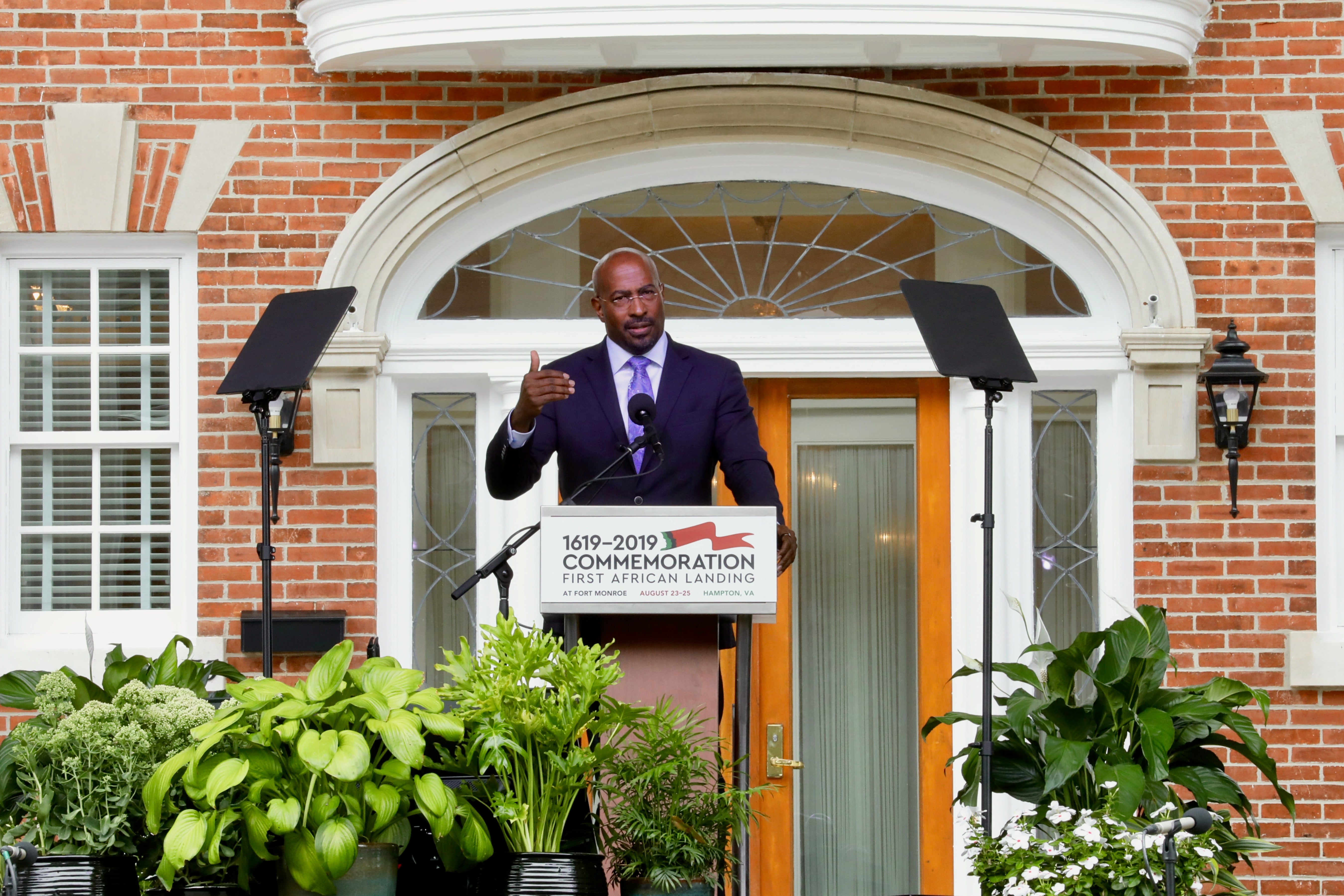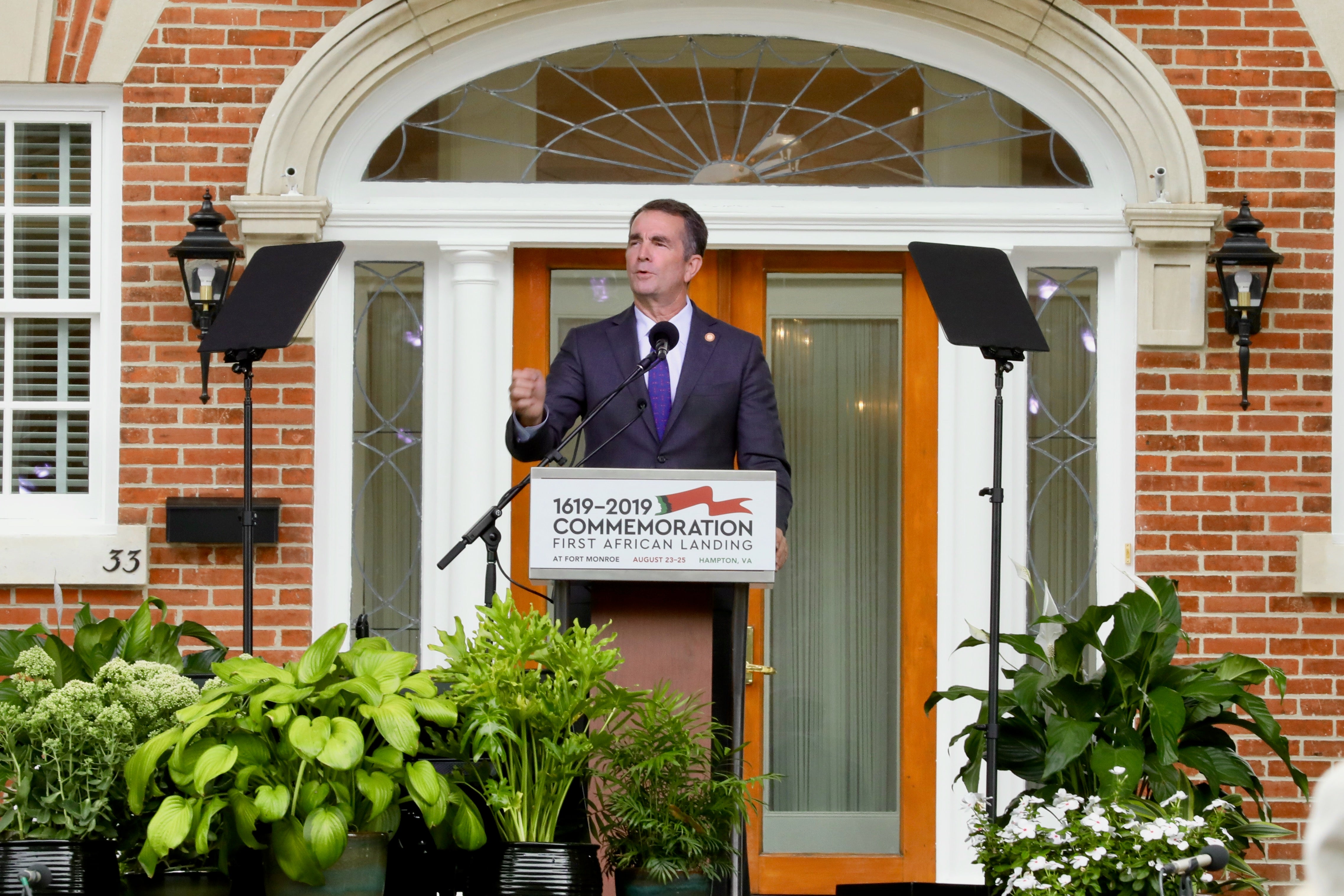
There was African drumming, gospel music, healing rituals, poetry, speeches—along with prayers and tears—as thousands gathered in Hampton, Virginia to commemorate 400 years since slavery began in English North America.
In late August of 1619, a ship landed in Point Comfort, Virginia (now present-day Hampton) with what was recorded as “20 and odd Negars” on board stolen from West-Central Africa.
When the `White Lion’ dropped anchor in waters surrounding what is now Fort Monroe National Monument, it set in motion the race-based system of slavery that would last for 246 years in America.
The 2019 Commemoration of the First African Landing was about remembering and honoring the ancestors while building a better nation for future generations. It was hosted by Virginia’s 2019 Commemoration, American Evolution, in partnership with Fort Monroe Authority, Fort Monroe National Monument, and the City of Hampton.
“We wanted to create a pilgrimage for African Americans and all Americans,” said Terry Brown, the first African American superintendent at Fort Monroe, a unit of the National Park Service. “We wanted people to learn about the heritage, struggles and triumphs of the first Africans who were brought to the shores of Point Comfort.”
Fort Monroe, which president Barack Obama designated a national monument in 2011, bustled this weekend with visitors hailing from around the country and world. In lawn chairs under white tents, children and adults waved American and flags from African nations. Artisans such as Loretta Craig of Virginia sold beautiful handmade quilts. The sounds of African drums, gospel, and classical music filled the air. Many people were dressed in colorful African attire.

From a spiritual cleansing and African naming ceremony on the beach at sunrise to a free concert with rapper/actor Common and Sounds of Blackness, participants told ESSENCE it was a powerful, poignant weekend.
“I only wish the entire nation could witness what is happening here,” said Rep. Karen Bass (D-CA), chair of the Congressional Black Caucus, who was joined by colleagues Rep. Bobby Scott (D-VA) and Lacy Clay (D-MO) at events. The CBC and House Speaker Nancy Pelosi, recently journeyed to Ghana to pay homage to the events of 1619.
Bass told the audience the commemorative events at Fort Monroe “acknowledged all of our nation’s history, not just the parts that make us feel good but the difficult parts as well.”
Other speakers ranged from Brycen Dildy, a dynamic 11-year-old who garnered a standing ovation with his remarks about being kind to others, to Doug Wilder, the first African American governor of Virginia, who spoke at a leadership luncheon. Virginia’s Lt. Gov. Justin Fairfax and attorney Van Jones shared personal family stories, tying them into the early Africans and millions of their descendants. Their labor and skills, they said, were integral to the United States becoming the global power it is today.

Black people “changed the landscape of America,” said Dr. Michael Eric Dyson in a fiery speech that touched on everything from Europe’s role in slavery, to resurgent racism under president Donald Trump. Still, he said, African Americans have made an indelible mark on the country from the beginning.
“We always had the flavor, wherever we go,” said Dyson to roars of approval from the crowd. “Whenever Black folks show up, we add color, character, confidence and consciousness.”
Virginia Governor Ralph Northam, who was ensnared in a scandal earlier this year involving blackface photos that surfaced in an old yearbook, also spoke at the ceremonies. Admitting his own racial shortcomings, he drew applause while declaring: “We must remember that Black history is American history.”

The governor told attendees that even as “white land-owning men” in the English Jamestown colony came together to establish a system of representative government, they left out people. Indeed, those excluded were women, the early Africans and Native Americans.
“That government did not represent [Black people] during 246 years of slavery. It did not represent them through nearly 100 years of Reconstruction and Jim Crow terror and discrimination,” said Northam, who used the occasion to announce a new state Commission on African American History Education. “And in many ways, it struggles to represent them today. That is the truth, and that is what we must reckon with as we move forward.”
The weekend events featured a preview of the new Fort Monroe Visitor and Education Center, cultural tours, living history demonstrations, storytelling, and youth activities. And at 3 p.m. on Sunday, national parks around the country, churches and community partners rang bells simultaneously for four minutes–one to honor each century of African American history and the ancestors.
Meanwhile, related 1619 programs have been held across Virginia, around the country, and on the African continent. For instance, the CBC and NAACP each had delegations travel to Ghana this summer.
On Friday evening, Hampton University’s Memorial Chapel was filled with educators, students and community members for a program centered around 400 years of Black perseverance.
Hosted by the Association for the Study of African American Life and History (ASALH) and its Hampton Roads branch, Dr. Sheila Flemming Hunter and fellow committee members helped plan the well-attended event. Partners included the National CARES Mentoring Movement, Hampton University, and the City of Hampton 2019 Commemorative Commission.
ASALH, founded in 1915 by Dr. Carter G. Woodson, the Father of Black History, is devoted to the research, interpretation, preservation and dissemination of the history of people of African descent to the global community.
A panel of scholars and historians—among them, Dr. Derrick Alridge, Dr. Colita Nichols Fairfax, Dr. Cassandra Newby-Alexander, Gloria Browne Marshall, Esq., and Prof. Robert Watson–shed light on the past, present and future of Black people in America through the lens of education, the law, the rape of Black women and dehumanizing Black men during slavery and more. At one point as the experts spoke, thunder could be heard outside the historic chapel and sheets of rain poured down. “The ancestors,” said one speaker, as many audience members murmured in agreement.
Susan L. Taylor, Editor-in-Chief Emerita of ESSENCE and Founder/ CEO of the National CARES Mentoring Movement, told those assembled that she made the trip to Hampton, Virginia to be part of the historic commemoration. She and her family also recently returned from Ghana, West Africa.

“I wanted us to see and remember those [slave] dungeons where they suffered bestial brutality, the depths of which we will never know,” said Taylor. “I also wanted to travel here to Hampton to help facilitate Black scholars presenting the truth of our fore-parents horrific suffering, their resistance and astonishing triumphs.”
The ancestors’ legacy drives her work with the National CARES Mentoring Movement, founded in 2006, in the wake of Hurricane Katrina as ESSENCE CARES. Its mission is to secure, heal and transform the lives of impoverished Black children by inspiring, recruiting and mobilizing masses of caring Black men and women to mentor and nourish them.
Saying “multitudes of Black children are suffering in poverty, and no one cares about them but us,” Taylor called upon African Americans to “remember our history and embrace our moral responsibility to “advance our sisters and brothers.”
“This is not the rough side of the mountain,” she told the crowd, asserting that many Black Americans today lead “privileged lives that our fore-parents could never have imagined.”
“We all complain about so much that is inconsequential. The most difficult days for our people are behind us. So now we able ones must rebuild the village. This is the big business of Black America, the most important work of our time.”







